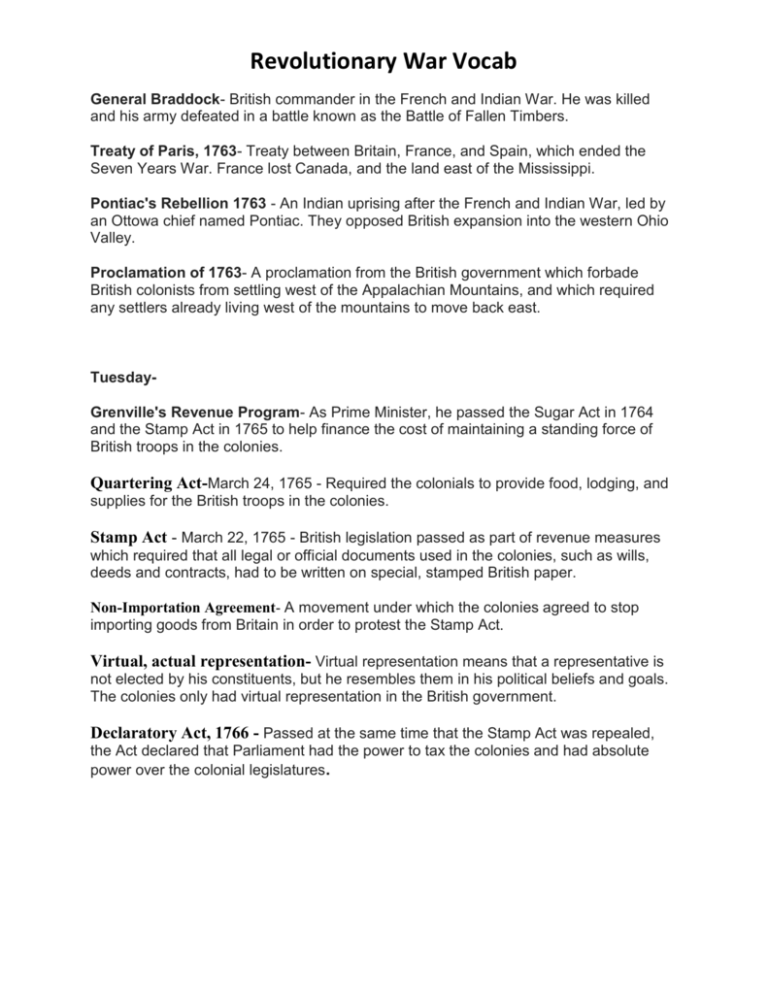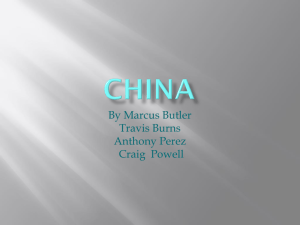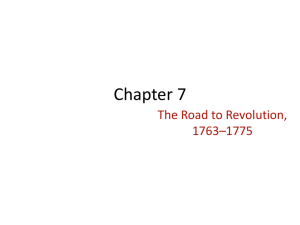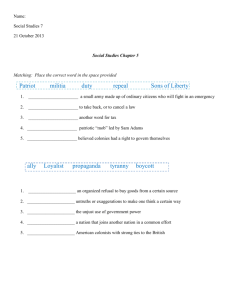File
advertisement

Revolutionary War Vocab General Braddock- British commander in the French and Indian War. He was killed and his army defeated in a battle known as the Battle of Fallen Timbers. Treaty of Paris, 1763- Treaty between Britain, France, and Spain, which ended the Seven Years War. France lost Canada, and the land east of the Mississippi. Pontiac's Rebellion 1763 - An Indian uprising after the French and Indian War, led by an Ottowa chief named Pontiac. They opposed British expansion into the western Ohio Valley. Proclamation of 1763- A proclamation from the British government which forbade British colonists from settling west of the Appalachian Mountains, and which required any settlers already living west of the mountains to move back east. TuesdayGrenville's Revenue Program- As Prime Minister, he passed the Sugar Act in 1764 and the Stamp Act in 1765 to help finance the cost of maintaining a standing force of British troops in the colonies. Quartering Act-March 24, 1765 - Required the colonials to provide food, lodging, and supplies for the British troops in the colonies. Stamp Act - March 22, 1765 - British legislation passed as part of revenue measures which required that all legal or official documents used in the colonies, such as wills, deeds and contracts, had to be written on special, stamped British paper. Non-Importation Agreement- A movement under which the colonies agreed to stop importing goods from Britain in order to protest the Stamp Act. Virtual, actual representation- Virtual representation means that a representative is not elected by his constituents, but he resembles them in his political beliefs and goals. The colonies only had virtual representation in the British government. Declaratory Act, 1766 - Passed at the same time that the Stamp Act was repealed, the Act declared that Parliament had the power to tax the colonies and had absolute power over the colonial legislatures. Revolutionary War Vocab Wednesday: Townshend Acts, reaction - Another series of revenue measures, passed by Townshend as Chancellor of the Exchequer in 1767, they taxed quasi-luxury items imported into the colonies, including paper, lead, tea, and paint. The colonial reaction was outrage and they instituted another movement to stop importing British goods. Boston Massacre, 1770 - The colonials hated the British soldiers in the colonies because the worked for very low wages and took jobs away from colonists. On March 4, 1770, a group of colonials started throwing rocks and snowballs at some British soldiers; the soldiers panicked and fired their muskets, killing a few colonials. This outraged the colonies and increased antiBritish sentiment. Thursday: Tea Act of 1773- an Act of the Parliament of Great Britain. The principal objective was to reduce the massive surplus of tea held by the financially troubled British East India Company in its London warehouses and to help the struggling company survive. Boston Tea Party - Boston patriots organized the Boston Tea Party to protest the 1773 Tea Act. In December 1773, Samuel Adams warned Boston residents of the consequences of the Tea Act. Boston was boycotting the tea in protest of the Tea Act and would not let the ships bring the tea ashore. Finally, on the night of December 16, 1773, colonials disguised as Indians boarded the ships and threw the tea overboard. They did so because they were afraid that Governor Hutchinson would secretly unload the tea because he owned a share in the cargo. Friday: Coercive Acts- Passed in response to the Boston Tea Party. Punishment for Boston including the closing of its port and a new quartering act. Tuesday 12/1: First Continental Congress- formed in response to the Intolerable Acts. 9 Colonies sent delegates Committees of Correspondence- Committees formed in Massachusetts and other colonies to keep Americans informed about British measures that would affect the colonies. Revolutionary War Vocab Declaration and Resolve- Created at First Continental Congress, states that all Colonists came from a common tradition and enjoyed rights guaranteed by the principles of the English Constitution, and the several charters. Committees of Observation and Safety - Created at First Continental Congress, These groups took on the function of local government. Organized militia, collected arms, MINUTEMEN, etc… Wednesday 12/2: Colonial Militia Minute Men Paul Revere William Dawes Prescott Battles of Lexington and Concord Thursday 12/3: Patriots Loyalists Patrick Henry Samuel Adams






